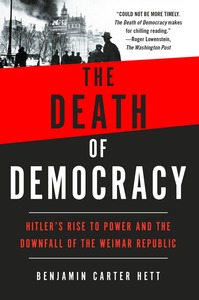You need to sign in or sign up before continuing.
Take a photo of a barcode or cover
143 reviews for:
The Death of Democracy: Hitler's Rise to Power and the Downfall of the Weimar Republic
Benjamin Carter Hett
143 reviews for:
The Death of Democracy: Hitler's Rise to Power and the Downfall of the Weimar Republic
Benjamin Carter Hett
dark
informative
reflective
fast-paced
Being that it’s historical, there are a lot of clunky moments with names and eras that are hard to keep track of all the time but overall it was an interesting read, and education in Germany in that time, and the way Hitler’s regime was able to come into power.
challenging
informative
reflective
medium-paced
informative
medium-paced
Of course there is one overriding reason for an American in 2018 to be interested in this book. The
Weimar Republic quite successfully brought Germany back from defeat and humiliation after the Great War. But big business wanted to bring down the unions and abolish fair treatment for workers, the army wanted more and more money for more and more weapons, farmers hated the multinational trade deals they thought were bankrupting them and bringing German agriculture down. Upstanding rural Germans held the bleeding-heart social-welfare lefty Social Democrats responsible. They hated the moral cesspool of atheistic, elite Berlin and the refugees pouring in from devastated eastern Europe who were turning Germany into a place it hadn't been when real Germans all pulled together before August 1914.
"Weimar's insurgent groups . . . wanted the fastest and easiest solutions to their own particular problems and . . . were deeply unwilling to compromise . . . ." "[T]he Nazis proved to be the most skillful politicians at capturing the resentments of the disaffected." Business and military leaders couldn't get a majority on their own, but they thought they could use Hitler to crush their opponents, keep him under control, and get rid of him when he'd done their work for them. "One after another the conservatives found themselves outmaneuvered and sidelined"--many of them imprisoned or shot.
"Thinking about the end of Weimar democracy in this way--as the result of a large protest movement colliding with complex patterns of elite self-interest in a culture increasingly prone to aggressive mythmaking and irrationality--strips away the exotic and foreign look of swastika banners and goose-stepping Stormtroopers. Suddenly the whole thing looks close and familiar. . . . Few people could imagine the worst possibilities . . . A civilized nation could not possibly vote for Hitler . . . When he became chancellor nonetheless millions expected his time in office to be short and ineffectual. . . . How could a German government systematically brutalize its own people? . . . Their innocence failed them, and they were catastrophically wrong about their future. We who come later have one advantage over them: we have their example before us."
Weimar Republic quite successfully brought Germany back from defeat and humiliation after the Great War. But big business wanted to bring down the unions and abolish fair treatment for workers, the army wanted more and more money for more and more weapons, farmers hated the multinational trade deals they thought were bankrupting them and bringing German agriculture down. Upstanding rural Germans held the bleeding-heart social-welfare lefty Social Democrats responsible. They hated the moral cesspool of atheistic, elite Berlin and the refugees pouring in from devastated eastern Europe who were turning Germany into a place it hadn't been when real Germans all pulled together before August 1914.
"Weimar's insurgent groups . . . wanted the fastest and easiest solutions to their own particular problems and . . . were deeply unwilling to compromise . . . ." "[T]he Nazis proved to be the most skillful politicians at capturing the resentments of the disaffected." Business and military leaders couldn't get a majority on their own, but they thought they could use Hitler to crush their opponents, keep him under control, and get rid of him when he'd done their work for them. "One after another the conservatives found themselves outmaneuvered and sidelined"--many of them imprisoned or shot.
"Thinking about the end of Weimar democracy in this way--as the result of a large protest movement colliding with complex patterns of elite self-interest in a culture increasingly prone to aggressive mythmaking and irrationality--strips away the exotic and foreign look of swastika banners and goose-stepping Stormtroopers. Suddenly the whole thing looks close and familiar. . . . Few people could imagine the worst possibilities . . . A civilized nation could not possibly vote for Hitler . . . When he became chancellor nonetheless millions expected his time in office to be short and ineffectual. . . . How could a German government systematically brutalize its own people? . . . Their innocence failed them, and they were catastrophically wrong about their future. We who come later have one advantage over them: we have their example before us."
I wasn't entirely sure what to expect from this book, particularly since it covers well-trodden ground. But Benjamin Carter Hett manages to tell a familiar story in a new, richly detailed way that manages not to be a heavy-handed metaphor for the present. What I found particularly valuable was his account of what the German right hoped to get out of a coalition with Hitler. It is of course well known how Hindenburg, Von Papen, etc. thought they could control him but I had never read a good account for what they wanted to use him for and why he became their last resort. Also provides a good portrait of Schleicher as the key player in the final days of the Weimar Republic.
Fantastic, vital reading for understanding the fall of democracy in the past and present.




